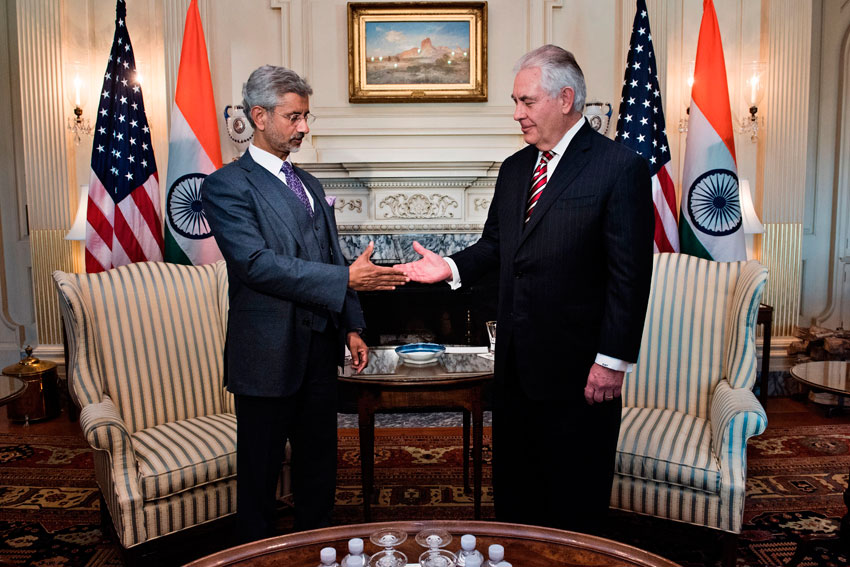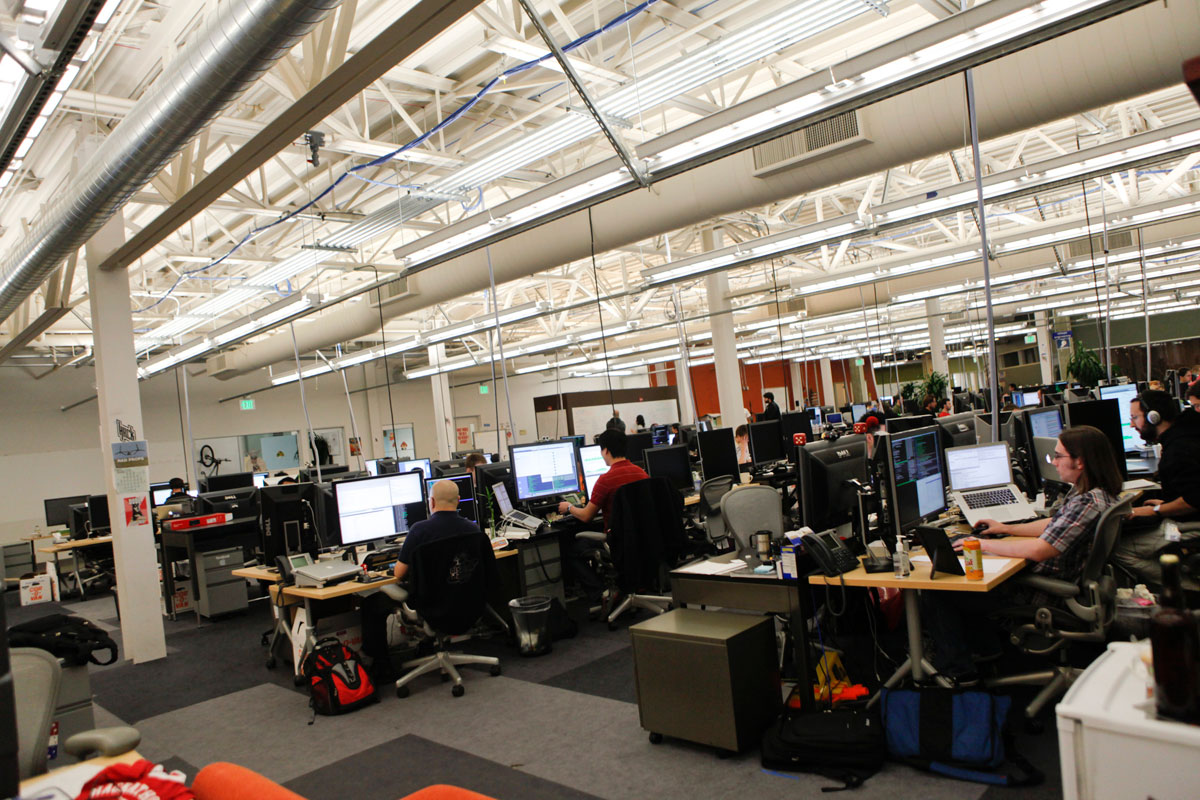H-1B Premium Processing Faces Temporary Suspension, New Reform Bill Introduced
Offices at Facebook headquarters in Palo Alto, Calif. Facebook is just one of the many tech giants that employs Indian tech workers. (Ryan Anson/AFP/Getty Images)
The U.S. said, March 4, it is temporarily suspending the ‘premium processing’ of H-1B visas from April 3, eliminating the option of shorter wait times for the program that helps highly skilled foreigners work at American firms. A new bill to strengthen the visa allocation process was also introduced in the U.S. Congress, writes Lalit K. Jha. – @Siliconeer #Siliconeer #H1BVisa #RoKhanna #USCongress @TiESV #TiESV #IndianAmerican #Immigration
Under the current system, companies submitting applications for H-1B visas for potential employees can pay extra for expedited processing, which is known as premium processing.
The suspension is effective April 3, and could last up to six months, according to the U.S. Citizenship and Immigration Services (USCIS).
The H-1B visas are widely used by Indian IT majors.
Premium processing costs an additional $1,225 and ensures a response from the USCIS in 15 days or the fee is refunded. Processing of standard H-1B applications—those that are not premium—takes between three to six months.
“This temporary suspension will help us to reduce overall H-1B processing time,” the USCIS said.
The change comes as President Donald Trump is said to be drafting a new version of his court-halted executive order that banned travelers from seven Muslim-majority countries from entering the U.S.
By temporarily suspending premium processing, the USCIS said it will be able to process long-pending petitions, which they have currently been unable to process due to the high volume of incoming petitions and the significant surge in premium processing requests over the past few years, and prioritize adjudication of H-1B extension of status cases that are nearing the 240-day mark.
For Silicon Valley companies, many of which employ large number of H-1B holders, this move could signal that waiting time for approval may get much longer.
Meanwhile, the USCIS also announced that it would start accepting the H-1B visa applications for the fiscal year 2018 beginning October 1, 2017, from April 3.
The U.S. has assured India that the H-1B visas issue was not a priority for it and would be part of the larger immigration reforms package that the new Trump administration is working on.
The assurance came amid an ongoing debate in the U.S. and reported moves by the Trump Administration to bring out an executive order to curtail the use of H-1B visas.
“There was a sense that there is a recognition of the contribution of the Indian tech sector. Certainly this is not very much…not a priority of the government. They are concerned with the immigration issue…most of the issues are quite different,” visiting Indian Commerce Secretary Rita Teotia told reporters at a news conference in Washington, D.C.
“Nevertheless when it is addressed, it would be part of the overall immigration package,” Teotia said.
Teotia, along with Indian Foreign Secretary S. Jaishankar, is currently in the U.S. meeting top officials of the Trump administration and the Congressional leadership.
India has been strongly taking up the case of H-1B visas with the Trump administration.

Bipartisan H1B, L1 Visa Reform Bill Introduced in U.S. Congress
A bipartisan group of four U.S. lawmakers, including Indian American Ro Khanna, March 4, introduced a legislation in the Congress to reform the current H-1B and L1 work visas and end its abuse by foreign companies.
The H-1B and L-1 Visa Reform Act of 2017 introduced by Congressmen Bill Pascrell, Dave Brat, Khanna and Paul Gosar is in addition to the nearly half a dozen similar legislations pending in the U.S. Congress either the House of Representatives or the Senate all of whom seek to close loopholes in the H-1B and L visa programs to reduce fraud and abuse, provide protections for American workers and visa holders.
Interestingly the latest move from four Congressmen come a day after a NASSCOM delegation concluded its trip to U.S. during which they met a number of U.S. lawmakers to sensitize them about the importance of H-1B and L1 visas.
A significant chunk of U.S. political leadership believes that Indian companies are major beneficiaries of this foreign guest worker program and allege that this resulted in displacement of American workers.
The H-1B and L-1 Visa Reform Act of 2017 has the endorsement of the American Federation of Labor and Congress of Industrial Organizations (AFL-CIO) and the Institute of Electrical and Electronics Engineers (IEEE).
The bill, a companion to the Senate’s version sponsored by Senators Chuck Grassley (R-IA) and Dick Durbin (D-IL), would restore Congress’ original intent for the H-1B and L-1 visa programs, a media release said.
The bill, if passed by both the House and the Senate and signed into law by the President, would require employers to make a good faith effort to recruit and hire American workers before bringing in foreign workers and prohibits employers from replacing American workers with H-1B and L-1 workers or giving preference to H-1B visa holders when they are filling open positions.
It will modify existing H-1B wage requirements, and establish wage requirements for L-1 workers.
The bill proposes to prohibit employers from outsourcing H-1B and L-1 visa holders to other sites unless the employer obtains a waiver, which is available only in limited circumstances when the rights of American workers are protected.
It gives more authority to the departments of Homeland Security and Labor to investigate fraud and abuse in the H-1B and L-1 programs by requiring the two departments to audit employers and share information, ensuring visa petitions are more effectively scrutinized.
Among others it proposes to prohibiting companies from hiring H-1B employees if they employ more than 50 people and more than 50% of their employees are H-1B and L-1 visa holders. This provision of the bill would majorly impact Indian companies.
The bill calls for creation of a new H-1B visa allocation system that gives top priority to workers who have earned advanced science, technology, engineering or mathematics (STEM) degrees from U.S. institutions.
It recommends increasing penalties on those who violate the law, and provides visa holders with a list of rights before they enter the U.S. to ensure they are better protected against mistreatment or underpayment of wages.
“This legislation will offer reforms that eliminate the abuse of the H1-B visa program. As the son of immigrants, I know that immigrants strengthen our nation and economy. But we cannot allow for companies to underpay foreign workers and use them to replace American workers,” Khanna said.
“Instead, we need American companies to invest in our own workforce. The bill will prevent the exploitation of foreign workers while still recognizing the contributions immigrants make to our economy,” he said.
Congressman Pascrell said abusing the visa system to get cheap labor hurts the American middle class and is something he cannot accept.
“The critical reforms in this bill will support American workers and create safeguards against the exploitation of visa workers,” he said.
“Too often companies capitalize on the loopholes in our immigration system to displace high-skilled American workers in search of cheap labor. This bipartisan legislation presents a real opportunity to prevent fraud and abuse in our visa system so it better serves the American worker,” Brat said.
According to the Congressman, the legislation would close loopholes in the H-1B and L visa programs to reduce fraud and abuse, provide protections for American workers and visa holders, and require more transparency in the recruitment of foreign workers.
“This bipartisan legislation would overhaul the H-1B and L-1 visa programs to protect workers and crack down on foreign outsourcing companies which deprive qualified Americans of high-skill jobs,” the media release said.


